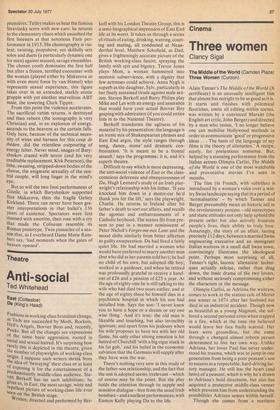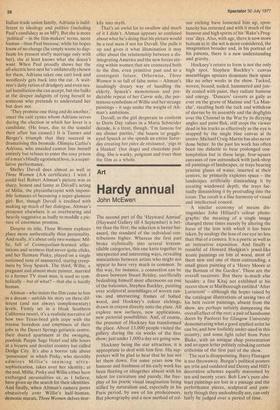Cinema
Three women
Clancy Sigal
The Middle of the World (Camden Plaza) Three Women (Curzon) Alain Tanner's The Middle of the World (X certificate) is an unusually intelligent film that almost has notright to be as good as it is. It starts and finishes with polemical flourishes, omits all editing within scenes, was written by a convinced Marxist (the English art critic, John Berger) and directed by a man who insists, 'I no longer believe one can mobilise Hollywood methods in order to communicate 'good' or progressive ideas . . The basis of the language of my films is the theory of alienation.' A recipe, surely, for pretentious nonsense. But, helped by a stunning performance from the Italian actress Olimpia Carlisi, The Middle of the World is one of the most watch able and provocative movies I've seen in months.
The film (in French, with subtitles) is introduced by a woman's voice over a wintry Swiss landscape saying that in a period of 'normalisation' — by which Tanner and Berger presumably mean an historic lull in the revolutionary process — old stereotypes and static attitudes not only help uphold the present order but also actively frustrate people's lives, their ability to truly love. Amazingly, the story of an affair, lasting precisely 112 days, between a married Swiss engineering executive and an immigrant Italian waitress in a small dull Swiss town, convincingly illustrates the ideological point. Perhaps most surprising of all, Tanner's tight, laconic 'alienation' techniques actually release, rather than drag down, the basic drama of tlie two lovers, and without seriously compromising either the characters or the message.
Olimpia Carlisi, as Adriana the waitress, comes to work in the station cafe of Moruz one winter in 1974 after her husband has died in an industrial accident. Though now as beautiful as a young Magnani, she suffered a second personal crisis when trapped in a fire, which at the time she believed would leave her face badly scarred. Her fears were groundless, but she came through a changed almost reborn person determined to live her own way. Unlike Adriana, her lover Paul has never understood his trauma, which was to jump in one generation from being a poor peasant's son to success as a respectable, hard-driving factory manager. He still has the heart (and lusts) of a peasant, which is why he's drawn to Adriana's bold directness, but also has acquired a protective middle-class veneer which prevents him from understanding the possibilities Adriana senses within herself.
Though she comes from a northern
Italian trade union family, Adriana is indifferent to ideology and politics (including Paul's candidacy as an MP). But she is more 'political' — in the film-makers' terms, more human — than Paul because, while his hopes know of no change (he simply wants to duplicate his present stuffy marriage only with her), she at least knows what she doesn't want. When Paul proudly shows her the all-electric love nest he's unilaterally chosen. for them, Adriana takes one curt look and wordlessly gets back into the car. A waitress's daily ration of drudgery and even sexual humiliation she can accept, but she balks at the deeper indignity of tying herself to someone who pretends to understand her but does not.
'They promise one thing and do another,' sneer the café cynics whom Adriana serves during the election in which her lover is a candidate. (He loses, due to the scandal their affair has caused.) It is Tanner and Berger's triumph that they succeed in dramatising this bromide. Olimpia Carlisi's Adriana, who unaided cannot free herself entirely but refuses to enter the cosy prison of a man's blindly egotistical love, is a superlative performance.
Shelley Duvall does almost as well in Three Women (AA certificate). I wish I could feel Robert Altman's picture was as sharp, honest and funny as Duvall's acting of Millie, the physiotherapist with impossible fantasies of becoming a super-glamour girl; But, though Duvall is credited with making up much of her dialogue, Altman's presence elsewhere is so overbearing and heavily suggestive as badly to muddle a picture of enormous promise.
Despite its title, Three Women explores ! place more authentically than personality. And really, it's about only two women: Millie, full of Cosmopolitan-learned affectations and sexiness that never quite clicks, and her flatmate Pinky, played on a single sustained note of mannered, staring creepiness by Sissy Spacek. The third, Willie, a pregnant and almost mute painter, married to a former TV stunt man, is used so symbolically — but of what? — that she is hardly human.
Altman — who insists the film came to him in a dream — unfolds his story On three different (and not always complementary) levels. Firmly set in a bleak Southern California resort, it's a realistic narrative of how two Texas-bred girls cope with the intense boredom and emptiness of their jobs in the Desert Springs geriatric centre, their shared apartment at the swinging, . poolside Purple Sage Hotel and idle hours at a bizarre and derelict country bar called Dodge City. It's also a horror tale about 'possession' in which Pinky, who slavishly admires Millie's seeming ultrasophistication, takes over her identity; at the end, Millie, Pinky and Willie either have exchanged personalities or, as I believe, have given up the search for their identities. And finally, ,when Altman's camera pores obsessively over Willie's half-human, demonic murals, Three Women delves mur
kily into myth.
That's an awful lot to swallow and much of it I didn't. Altman appears so confused about what he's doing that his picture would be a real mess if not for Duvall. She pulls it up and gives it what illumination it may offer about the relationship between a disintegrating America and the new forces stirring within women, that are connected both to the dim, even primitive past and to a contingent future. Otherwise, Three Women is so full of false notes — Altman's insultingly dreary way of handling the elderly, Spacek's monotonous and predictable repeat of her Carrie sole, the portentous symbolism of Willie and her strange paintings — it sags Under the weight of Altman's ambitions.
Duvall, as the girl desperate to conform to Doris Day values in a Maria Schneider decade, is a treat, though. 'I'm famous for my dinner parties,' she boasts to goggleeyed Spacek as she spends an entire Saturday creating her piece de resistance, 'pigs in a blanket' (hot dogs) and chocolate pudding. She is wacky, poignant and truer than the film as a whole.



































 Previous page
Previous page